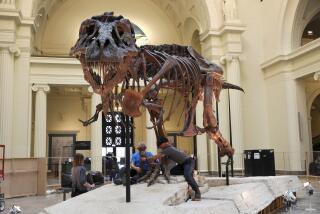Monstrous T. Rex Is Unveiled in Chicago
CHICAGO — The city identified with big shoulders, the Sears Tower and Michael Jordan has another large, imposing icon to share with the world.
The reassembled skeleton of a 67-million-year-old Tyrannosaurus rex named Sue went on display Wednesday for the first time.
Awash in all the hoopla of a Hollywood premiere, hundreds of children and other visitors packed the main hall of the Field Museum of Natural History to witness the unveiling of the largest, most complete and best-preserved T. rex skeleton ever discovered.
“She’s really big and she’s really cool. What else can you say?” said Sarah Bosley, a fifth-grader from Castle Rock, Colo.
The skeleton is named for Sue Hendrickson, the fossil hunter who found it in the badlands of South Dakota in 1990. Sue cost the museum $8.36 million at an auction.
The skeleton of the meat-eating predator is 13 feet tall at the hips and 41 feet long, with teeth as long as a human forearm.
The museum will display Sue in the main hall for the next three years and plans to move her to a new facility within the museum.
The museum said 10,000 people had come to gawk at the exhibit in the first few hours after it opened and it expected steady crowds.
The museum also announced that the creature had provided some scientific surprises about the ferocious species during the nearly three years it was reassembled, bone by bone.
One was the presence of a wishbone, the first found in a T. rex and additional proof for those who believe dinosaurs are related to birds. The wishbone is a structure unique to fowl.
The fossil is the first of a T. rex found with an eardrum bone called a stapes--also found in birds--that helps transmit sound to the inner ear.
Experts said Sue probably walked at a relatively slow 6 mph--with a top speed of perhaps 15 mph--a pace slower than scientists had thought but swifter than other dinosaur species.
The animal also had a keen sense of smell, thanks to huge olfactory lobes, leading experts to believe it may have moved through life “nose first” but shedding no light on whether it was a predator or a scavenger.
Hendrickson told reporters at the unveiling that finding the fossil, which is 90% complete, and seeing it come to life was a thrill equivalent “to winning several lotteries.”
The dinosaur’s head was replaced with a plastic replica in the assembly because the real thing weighed too much. The actual head--5 feet long--is displayed separately at floor level, where visitors can stare it in the eyes.

